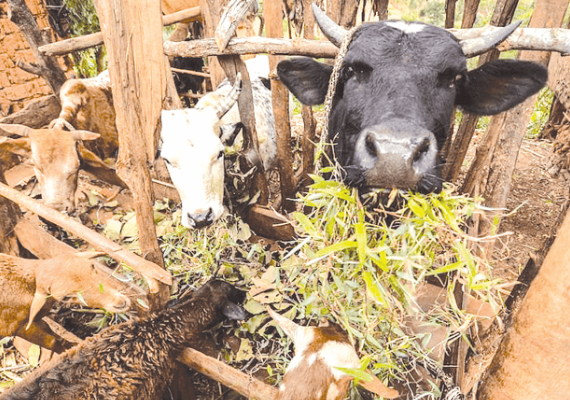If the proposed Livestock Bill 2024 passes in Parliament, all forms of livestock, including beef and dairy cattle, pigs, sheep, goats, horses, and camels, will be regulated by a new authority. Sponsored by Kimani Ichung’wah, the Leader of Majority in the National Assembly and MP for Kikuyu, the Bill aims to prohibit unregistered livestock farmers from producing animal feeds for sale.
Any unregistered farmer caught manufacturing feeds for sale will face a penalty of Sh500,000 or a one-year prison sentence.
The Livestock Inputs and Products Regulatory Authority will also determine the types of inputs permissible for livestock production. Farmers found using prohibited ingredients could face a two-year prison sentence or a fine of Sh2 million.
The Bill states, “A person shall not import, manufacture, compound, mix or sell any animal feedstuff other than a substance that the Authority may, by order, declare to be an approved animal feedstuff.”
It adds: “A person who contravenes this regulation is liable, on conviction, to a fine not exceeding five hundred thousand shillings or imprisonment for a term not exceeding twelve months or both.”
The Bill inhibits any person or company from engaging in commercial livestock breeding unless they are registered by the new authority and hold a valid license issued to operate as such.
“A registered livestock breeder shall not use the premises, facility, machinery, plant article or thing specified in the registration certificate and license to conduct any business other than livestock breeding unless that other business is related to livestock breeding and the Authority has granted permission in writing thereof,” sections of the Bill state.
Ichung’wah has also proposed in the Bill that beekeepers be registered, and that standards for beehives and their branding, along with the disposal of bees, honeycombs, and beehives, be regulated through consultations between the Cabinet Secretary in charge of Livestock and the Council of Governors.
According to the Majority Leader, the Bill is crucial for reviving the struggling and largely unregulated livestock sector. However, if enacted, it will create new government positions at a time when President William Ruto’s administration is implementing austerity measures due to increasing financial challenges.
Ichung’wah suggests that the new authority, which will replace the National Livestock Development and Promotion Service, be led by a chairperson appointed by the President, alongside a Principal Secretary responsible for Livestock.
The management team will also include the Director of Veterinary Services, the Director of Livestock Production, and a County Executive Committee Member appointed by the Council of Governors.
The new regulator will oversee the production, manufacture, importation, exportation, distribution, and sale of animal feedstuff, including fodder, concentrates, supplements, feed additives, and premixes, to ensure compliance with national standards.
It will also be responsible for approving and registering breeding animals, conducting performance recording and genetic evaluations, and monitoring the sustainable use and conservation of animal genetic resources. Additionally, the regulator will oversee the utilization of both imported and local animal genetic resources aimed at breed improvement.
“The Authority will oversee the regulation of both imported and locally manufactured equipment used in the livestock sector, manage the production, processing, sale, and importation of hive products, establish standards for livestock infrastructure—including the design and construction of livestock structures—and maintain a national database for actors in the livestock value chain, including breeders,” the proposed law states in part.
The Authority will primarily be led by a chief executive officer appointed by its board, along with an ex-officio board member who can be reappointed after demonstrating satisfactory performance over a three-year term.
The Bill grants the Authority the power to establish various institutions focused on maximizing productivity within the sector. Among these institutions will be the Kenya Livestock Research Organisation, the Livestock and Livestock Products Marketing Board, and the Livestock Inputs and Products Regulatory Authority, among others. According to Ichung’wah, these institutions will be enhanced through the establishment of training facilities.



